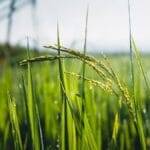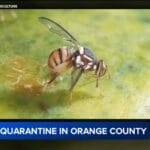Main Points In Hindi (मुख्य बातें – हिंदी में)
यहां दिए गए पाठ के मुख्य बिंदु इस प्रकार हैं:
-
अधिक वर्षा और खरिप मौसम: अच्छी बारिश के कारण खेतों में बढ़ते खरपतवारों ने किसानों के लिए समस्याएं बढ़ा दी हैं, जिससे जुलाई से सितंबर के दौरान हर्बिसाइड उत्पादों की बिक्री में वृद्धि हुई है।
-
कंपनियों के लाभ में वृद्धि: हर्बिसाइड उत्पादों की बिक्री में वृद्धि के चलते कंपनियों जैसे धनुका का लाभ 117 करोड़ रुपये बढ़ा है, हालांकि इसके साथ ही किसानों के लिए खरपतवार नष्ट करने की लागत भी बढ़ी है।
-
श्रम की कमी और उच्च लागत: श्रमिकों की कमी और श्रम लागत में वृद्धि के कारण, जो किसान पहले हर्बिसाइड का उपयोग नहीं करते थे, उन्होंने इस बार इनका उपयोग बढ़ा दिया है।
-
हर्बिसाइड की बढ़ती मांग: बिगहाट जैसी एग्रीटेक कंपनियों ने अत्यधिक वर्षा के कारण हर्बिसाइड उत्पादों की मांग में वृद्धि की सूचना दी है, खासकर उत्पाद जैसे एट्राज़िन, पैराक्वाट और ग्लाइफोसेट।
- हर्बिसाइड का बाजार हिस्सा: भारत में हर्बिसाइड्स अब कृषि रसायन उद्योग का 40 प्रतिशत हिस्सा रखते हैं और इसका CAGR विकास 2024 से 2028 तक 3.82 प्रतिशत होने की उम्मीद है।
Main Points In English(मुख्य बातें – अंग्रेज़ी में)
Here are the main points based on the provided text:


-
Increased Weed Problems Due to Rain: The recent good rainfall has led to a surge in weed growth in farmers’ fields, prompting a significant increase in herbicide sales during the critical Kharif season.
-
Rising Herbicide Sales and Company Profits: Companies producing herbicides have reported substantial growth in earnings; for instance, Dhanuka saw a profit increase of Rs 117 crore from July to September, indicating strong market demand.
-
Higher Demand for Herbicides Over Other Chemicals: While sales for herbicides have soared, there has been a decline in other agrochemical categories like insecticides and fungicides, primarily due to labor shortages and rising costs.
-
Labor Cost Influence: The increase in labor costs and a shortage of available workers has led many farmers, including those traditionally not using herbicides, to turn to these products for weed management.
- Market Share and Future Growth: Herbicides now account for 40% of the agri-chemical market in India and are expected to grow at a CAGR of 3.82% from 2024 to 2028, reflecting their rising importance in agricultural practices.
Complete News In Hindi(पूरी खबर – हिंदी में)
इस बार लगातार अच्छी बारिश के कारण खेतों में उगने वाली जंगली घास ने किसानों की समस्याओं को बढ़ा दिया है। इसी वजह से जुलाई से सितंबर के बीच, जो ख़रीफ सीज़न के सबसे महत्वपूर्ण महीने हैं, हर्बिसाइड उत्पादों की बिक्री में काफी बढ़ोतरी देखी गई है। इस बात का अंदाजा इस तथ्य से लगाया जा सकता है कि इस अवधि में हर्बिसाइड बनाने वाली कंपनियों के मुनाफे में शानदार बढ़ोतरी हुई है, जैसे कि धनुका का मुनाफा 117 करोड़ रुपये बढ़ा है। उद्योग के लिए यह फायदेमंद रहा, लेकिन किसानों के लिए घास नष्ट करने की लागत बढ़ गई है। हालांकि, यह लागत मैन्युअल तरीके से घास हटाने की तुलना में कम बताई जा रही है।
कृषि में इस्तेमाल होने वाले रसायनों बनाने वाली कंपनियों ने इस ख़रीफ सीज़न में हर्बिसाइड की बिक्री में वृद्धि दर्ज की है। हालांकि, कीटनाशकों और फफूंदनाशकों जैसे अन्य श्रेणियों में बिक्री कम रही है। एक बिजनेसलाइन रिपोर्ट के अनुसार, UPL SAS के CEO आशीष डोवाल ने कहा कि अधिक बारिश का मतलब है हर्बिसाइड उत्पादों की बिक्री में वृद्धि।
श्रम Kosten बढ़ने से उत्पादों का उपयोग बढ़ा
आशीष डोवाल ने बताया कि अगस्त-सितंबर में लगातार बारिश के कारण हर्बिसाइड की मांग बहुत बढ़ गई है। उन्होंने कहा कि इस दौरान फफूंदनाशक और कीटनाशकों की बिक्री प्रभावित हुई है। भारत में हर्बिसाइड की श्रेणी अन्य कृषि रसायनों की तुलना में तेजी से बढ़ रही है। डोवाल ने कहा कि श्रमिकों की कमी और बढ़ते श्रम लागत के कारण, जिन किसानों ने पहले कभी हर्बिसाइड का उपयोग नहीं किया, उन्होंने इस बार इसका उपयोग किया है।
ये उत्पाद बहुत उपयोग में लाए जा रहे हैं
बिगहाट, एक एग्रीटेक फर्म जो कृषि उत्पादों को सीधे किसानों तक पहुंचाती है, ने इस ख़रीफ फसल सीज़न में हर्बिसाइड उत्पादों की मांग में वृद्धि देखी है। बिगहाट में कृषि विज्ञान के प्रमुख श्रीकांत वेमुला ने कहा कि हालिया बारिश ने घास प्रबंधन में चुनौतियाँ पैदा की हैं, जिससे हर्बिसाइड समाधान की आवश्यकता बढ़ गई है। श्रम लागत बचाने के लिए, किसान एट्राज़ीन, पैराक्वाट, ग्लाइफोसेट और ग्लुफोसिनेट अमोनियम 13.5 जैसे हर्बिसाइड उत्पादों का उपयोग कर रहे हैं। यह उत्पाद फसल बोने के पहले और बाद में घास को खत्म करने में प्रभावी है।
कृषि रसायन उद्योग में हर्बिसाइड का 40 प्रतिशत हिस्सा
गोदरेज एग्रोवेट लिमिटेड के क्रॉप प्रोटेक्शन बिजनेस के CEO राजवेलू एनके ने बताया कि भारत में हर्बिसाइड बाजार तेज़ी से बढ़ रहा है, घरेलू और वैश्विक मांग को देखते हुए। हर्बिसाइड भारत के कृषि रसायन क्षेत्र में एक प्रमुख खंड बन रहा है, जिसमें 2024 से 2028 के दौरान 3.82 प्रतिशत CAGR वृद्धि का अनुमान है। वर्तमान में, हर्बिसाइड पहले से ही भारत के कृषि रसायन उद्योग में 40 प्रतिशत बाजार हिस्सेदारी रखते हैं। क्रिस्टल क्रॉप प्रोटेक्शन लिमिटेड के CEO अंकुर अग्रवाल ने कहा कि उनकी कंपनी ने भी ख़रीफ फसल सीज़न के दौरान हर्बिसाइड की बिक्री में वृद्धि देखी है। उन्होंने कहा कि इस साल हर्बिसाइड की बिक्री कीटनाशकों की तुलना में बेहतर रही है।
इसे भी पढ़ें –
Complete News In English(पूरी खबर – अंग्रेज़ी में)
This time due to good rains, weeds in the fields have increased the problems of the farmers. Due to this, a big jump has been seen in the sales of herbicide products from July to September, the most important months of Kharif season. This can be gauged from the fact that during the quarter, tremendous growth has been recorded in the earnings of the companies manufacturing these products, like Dhanuka’s profit has increased by Rs 117 crore. This has been beneficial for the industry, but the weed disposal costs for farmers have increased. However, the cost is said to be lower compared to manual disposal.
Companies manufacturing chemicals used in agriculture have registered an increase in the sales of herbicides in this Kharif season. However, sales in other categories like insecticides and fungicides have been low. According to a BusinessLine report, UPL SAS CEO Ashish Doval said that more rain means good for the sales of herbicide products.
Product usage increased due to increase in labor costs
Ashish Doval said that due to continuous rains during August-September, there is a lot of demand for herbicides. He said that during this period the sale of fungicides and pesticides was affected. The category of herbicides in the country is growing faster than other agrochemicals. Doval said that due to shortage of laborers and rising labor costs, farmers who never used herbicides have also used them this time.
These products are being used a lot
BigHaat, an agritech firm that sells agricultural inputs directly to farmers across the country, has recorded a surge in demand for herbicide products due to excessive rains this Kharif crop season. Srikanth Vemula, head of agricultural science at BigHaat, said that the recent rains have created challenges in weed management, which has increased the need for herbicide solutions. To save labor costs, farmers are using herbicide products like atrazine, paraquat, glyphosate and glufosinate ammonium 13.5. This product is effective in eliminating weeds before and after crop sowing.
40 percent share of herbicide in agri chemical industry
Rajavelu NK, CEO, Crop Protection Business, Godrej Agrovet Limited, said that the herbicide market in India is growing rapidly in view of domestic and global demand. Herbicides are becoming a major segment within India’s agri chemical sector with a projected CAGR growth of 3.82 percent from 2024 to 2028. Currently, herbicides already hold 40 percent market share within India’s agri chemical industry. Ankur Aggarwal, CEO of Crystal Crop Protection Limited, said that his company has also seen an increase in herbicide sales during the Kharif crop season. He said that this year the sales of herbicides were better than pesticides.
Read this also –






